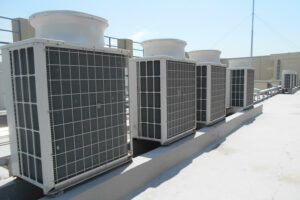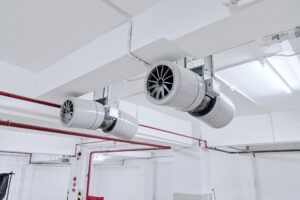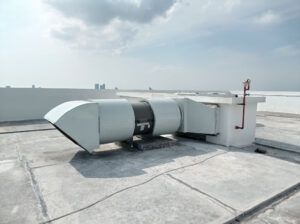The Vital Role of HVAC Contractor in Industrial and Commercial Settings
In today’s fast-paced world, industrial and commercial buildings rely heavily on efficient Heating, Ventilation, and Air Conditioning (HVAC) systems. HVAC contractor plays a crucial role in ensuring these environments remain safe, comfortable, and energy-efficient, which is critical for the productivity of workers and the longevity of equipment. Whether it’s a sprawling factory or a high-rise office building, proper HVAC design and installation are vital for maintaining optimal indoor conditions.
What is HVAC Engineering?
HVAC engineering involves the design, installation, and maintenance of systems that regulate heating, ventilation, and air conditioning. These systems ensure indoor environments are kept at comfortable temperatures, provide adequate ventilation, and maintain air quality. In industrial and commercial settings, HVAC systems are responsible for more than just comfort—they protect equipment, regulate humidity, and ensure compliance with health and safety standards.
The Importance of HVAC in Industrial Settings
1. Regulating Temperature for Equipment and Processes
Industrial facilities often operate equipment that generates significant heat. Without proper temperature regulation, this heat can degrade machinery, lead to malfunctions, and even cause safety hazards. HVAC systems help maintain the necessary cool temperatures for equipment and processes, ensuring that everything runs smoothly and efficiently.
For example, in manufacturing plants where precision equipment is used, such as in electronics or automotive industries, maintaining a stable temperature is critical to preventing costly downtime and ensuring the quality of the final products.
2. Improving Worker Productivity
High temperatures, poor ventilation, or inadequate air conditioning can reduce worker productivity and increase the likelihood of heat-related illnesses. HVAC systems are essential for creating a comfortable working environment, ensuring that employees are able to perform their tasks effectively without health risks caused by poor air quality or extreme temperatures.
3. Energy Efficiency and Cost Savings
Modern HVAC systems are designed with energy efficiency in mind, which can result in significant cost savings for industrial operations. HVAC contractor design systems that not only optimize temperature control but also minimize energy use by leveraging advanced technologies such as smart thermostats, variable speed fans, and energy recovery ventilators.
In industries where energy consumption is high, such as in chemical manufacturing or food processing, these savings can make a substantial impact on overall operational costs.
The Importance of HVAC Engineering in Commercial Settings

1. Comfort and Air Quality for Occupants
In commercial spaces such as office buildings, shopping malls, and hospitals, maintaining comfortable indoor temperatures is essential for occupants. Proper HVAC engineering ensures that the air quality is high, providing adequate ventilation to prevent the buildup of contaminants like dust, bacteria, and allergens.
Air quality is particularly important in environments such as hospitals, where poor ventilation can contribute to the spread of airborne diseases. HVAC contractor must carefully design these systems to meet stringent health and safety standards, ensuring that the air remains clean and safe for all occupants.
2. Sustainability and Green Building Standards
Sustainability is a growing concern in commercial real estate, and HVAC systems play a critical role in helping buildings meet green building standards like LEED (Leadership in Energy and Environmental Design). HVAC contractor are often tasked with designing systems that use renewable energy sources, reduce carbon emissions, and minimize water consumption.
By incorporating energy-efficient technologies and sustainable practices, HVAC contractor help businesses reduce their environmental footprint while also lowering operational costs.
3. Noise Control
In commercial settings such as offices and conference rooms, excessive noise from HVAC systems can be disruptive. Engineers must carefully design systems that balance the need for temperature control and ventilation with the demand for a quiet working environment. This involves selecting the right equipment and optimizing placement to minimize noise while maintaining effective airflow and climate control.
The Role of HVAC Engineers at PT Ikanindo Rekatama Cipta
At PT Ikanindo Rekatama Cipta, we understand the critical importance of HVAC contractor in both industrial and commercial settings. With over 30 years of experience, we provide comprehensive HVAC engineering solutions tailored to meet the specific needs of each project. Our team of skilled engineers specializes in designing, installing, and maintaining HVAC systems that prioritize energy efficiency, comfort, and reliability.
Whether you need a new HVAC system for a commercial office building or an industrial plant, PT Ikanindo Rekatama Cipta offers customized solutions that ensure optimal indoor conditions, reduce energy consumption, and comply with local safety standards. We take pride in delivering high-quality service and building long-term partnerships with our clients.
Conclusion
In both industrial and commercial settings, HVAC contractor is essential for creating safe, comfortable, and efficient environments. From regulating temperatures in manufacturing plants to ensuring clean air in hospitals, HVAC systems play a vital role in modern building design and operation. By partnering with experienced HVAC engineers like PT Ikanindo Rekatama Cipta, businesses can ensure that their HVAC systems are designed and maintained for maximum efficiency, safety, and cost savings.
Need expert HVAC contractor? Contact PT Ikanindo Rekatama Cipta today for more information on how we can help with your next project.


